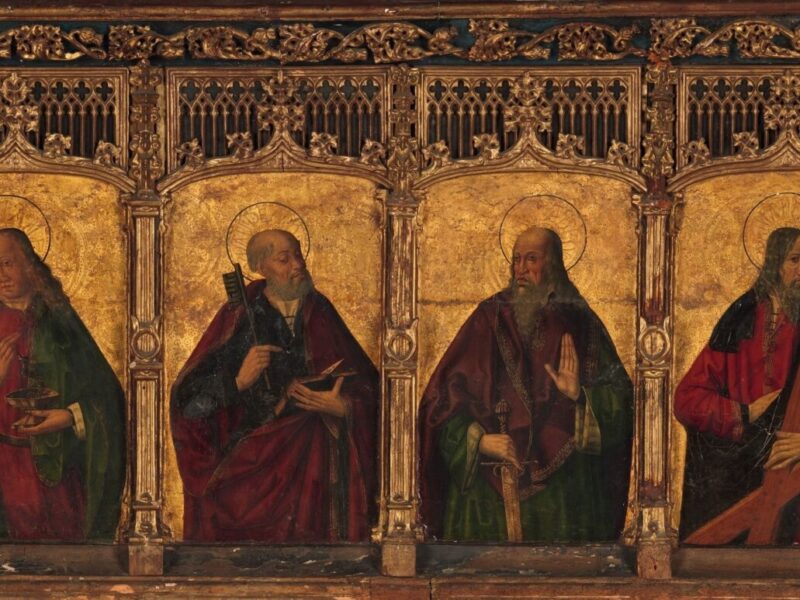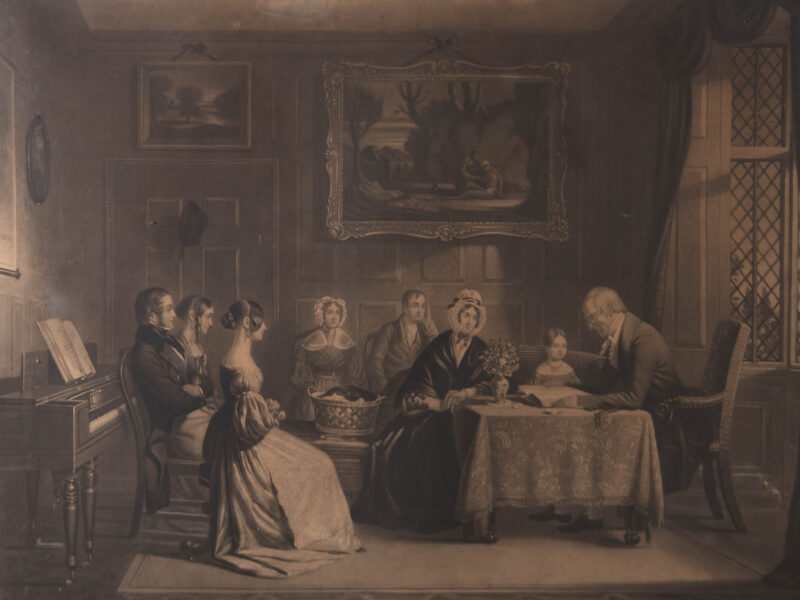Eric Lionel Mascall (1905-93) was one of the best–perhaps the sharpest and most lucid–of orthodox Anglican theologians in the twentieth century. An Anglican priest who finished his career as Professor of Historical Theology at King’s College in the University of London, Mascall excelled in mathematics at the university, and boasted of never having been formally trained in graduate-level theology. These two facts might help explain why his theology was hailed for being so wide-ranging, incisive, and elegant.
Mascall wrote books in both philosophical and dogmatic theology. He was chosen to deliver two of Britain’s most prestigious lecture series, the Gifford and Bampton Lectures. The first was published as The Openness of Being (1971), and the second as Christian Theology and Natural Science (1956). The latter was celebrated by some as the best treatment to that day of the relationship between Christian faith and modern science.
The scope of Mascall’s writings was broad. He did serious work on the subjects of creation, epistemology, religious language, the Incarnation, the Trinity, the Church, ministry, and sacraments. He determined to converse with Protestants, Catholics, and Eastern Orthodox, and read their best theologians. His thinking displayed an oft-noted balance—between reason and revelation, the natural and the supernatural (nature and grace), philosophy and theology. Unlike some of his century’s theologians, he accepted the traditional theism of the Thomistic tradition, and rejected process and Hegelian thought. He believed in a properly Christian natural theology, but insisted that special revelation surpasses and controls what nature and reason show of God. He accepted the analogy of being, but did not believe that classical proofs could provide certainty. True faith, for Mascall, is a work of the Spirit that provides intuitive confirmation of what revelation declares. For this modest and gentle but humorous Anglican, the Christian life is a matter of daily liturgical prayer, participation in the sacraments especially Eucharist, and gradual transformation by incorporation into Christ through his Church.
Christ, Christian and the Church (orig. 1946, now reprinted with Hendrickson 2017, available here) is the closest thing we have to a Mascallian systematic theology. It is dedicated to the proposition that the center of Christian faith is the Incarnation. By baptism, he asserts, men and women are recreated through incorporation into the human nature of Jesus. Sanctification is the progressive realization in the moral realm of the change made in the ontological realm by baptism. Incorporation into Christ is incorporation into the Church, which is a living organism. The Church in its essence is simply the human nature of Christ. All the thought, prayer, and activity of Christians—insofar as they are brought into the sphere of redemption—are the acts of Christ himself in and through his Body. The thread that unites all these ideas for Mascall is the doctrine of the permanence of the manhood of the glorified and ascended Christ. This, he maintains, is the central principle of Christian theology.
Mascall’s balanced focus on the Incarnation eliminates the false binaries that bedevil so much of the Church today. In Christ, the Christian and the Church, he shows that justification involves both imputation and impartation, that eschatology is both realized and futurist, that grace is offered universally and the Church is the only ark of salvation, that the Eucharist is both participation in the worship of heaven and the re-presentation of the once-for-all sacrifice of Calvary, that Christian faith must rest on both personal devotion and liturgical worship, that faith is not opposed to (orthodox) mysticism, and that revelation containing both propositions and mysterious images is compatible with rational (but not rationalistic) theology.
The book’s chapters explore the Incarnation, Christology, atonement, incorporation, ecclesiology, anthropology, Eucharist, prayer, and theology. Let me suggest briefly eight ways in which its chapters might help rectify some theological problems facing the Church today.
First, Mascall’s emphasis on Incarnation can help address a gospel minimalism that would reduce the faith to a legal transaction in the sky, removed from the sinner’s inmost self. Mascall insists that because the Son took human nature up into himself, he “supernaturalizes” (80) the person to whom he is joined by faith. Therefore justification is not merely forensic. God does not impute without also imparting life in and with Christ. Becoming a Christian means being incorporated into the glorified manhood of the ascended Christ.
Second, worship is not watching performers in a rock band or listening to an intellectual explication of biblical texts. Instead it is being caught up into the act whereby Christ eternally adores the heavenly Father, as we sit with him in heavenly places. Worship is the raison d’etre of the Church, God the Spirit offering God the Son to God the Father in an eternal celebration we are enabled to join. Preaching is of course part of every good worship service, but its final purpose is adoration.
Third, the Church is not a voluntary association of like-minded people, but a Body of people ontologically joined to the glorified manhood of Jesus. The life of the Church is the life of the Trinity imparted to men and women. It is not merely a society of people associated with God, but the divine Society itself, the life of the Godhead reaching out to humanity and taking humanity up into itself. It is not an organization but an organism.
Redemption therefore (fourth) is not merely eternal life insurance but renewal. It is renovation by re-creation.
Ongoing re-creation takes place by the Spirit, and especially through the Church’s sacraments (fifth), particularly the Eucharist. The Reformers were right, says Mascall, that the body of Christ is at the right hand of the Father in heaven. But against Zwinglian memorialism Mascall argues that the consecrated bread and wine are taken up into heaven and joined with the glorified Body. Mascall suggests that a sign merely represents while a sacrament re-presents. The Eucharistic signs are also a sacrament. The Body and Blood are present in a special way peculiar to a sacrament, without being locally in a particular place. He notes that the 1662 Book of Common Prayer implies a “real and essential presence” and denies a “corporal” or materialistic presence. Because we commune with the humanity and not just the divinity of Christ, the Eucharist admits us to the other dimension called heaven, where we join the perpetual intercession of the Great High Priest.
Prayer (sixth) is therefore neither merely my asking or praising but participation with all the Church in Christ’s prayer. That is why we say “our” in the liturgy of the Lord’s Prayer, with its implication that all truly Christian prayer is the prayer of Christ. Thus the Christian is the “liturgical man” who joins the perpetual prayer that the Messiah forever offers in heaven.
Against the last century’s relative relegation of Christian theology to the university, Mascall insisted that theology (seventh) is in, from, and for the Church. The best Christian theologians are dedicated to the Church’s prayer and sacraments. They are people of humility and faith who adhere to Jesus.
Finally (eighth), Mascall warns against any part of the Church conforming itself to only one theologian. Individual reformers “may accomplish much that is of value” and be instruments of God, but “they are no more than the generality of the faithful immune from error, and there are certain forms of error to which they are especially prone” because of their location in a particular age. All theology should “be checked by the tradition which the Church received from her Lord as her own treasure; otherwise the last state of a reformed Church may well be worse than the first” (242). In Christ, the Christian and the Church and his other work over four decades, Mascall illustrates a theological method which would do today’s Anglicans well: listening keenly to the Scriptures with the assistance of insights from the Reformers but with equal attentiveness to the Fathers.
Let me recommend another classic from Mascall, his Corpus Christi: Essays on the Church and the Eucharist. It was published in 1953 and has gone out of print, but I am working on bringing it out again. It is another little gem, filled with beauty and profundity. Here is a choice quote that represents the tip of a beautiful iceberg submerged in this book:
In the last resort the sacraments do not exist to remind us of anything, but to make and preserve and extend the Body of Christ, the holy people of God. They exist as the means by which Christ draws men and women into his own self in order that his Body the Church, the new human race, the “whole and holy society of the redeemed and sanctified city,” may be offered to God by the great High Priest.
I hope these few words of mine whet the appetite of readers to plunge into the works of E.L. Mascall, the finest Anglican theologian of the 20th century.
This Introduction was adapted from the Foreword to Christ, the Christian and the Church by E.L. Mascall, copyright 2017 by Hendrickson Peabody, Massachusetts. Used by permission. All rights reserved.




'E.L. Mascall: A Theologian in, from, and for the Church' have 2 comments
January 7, 2020 @ 2:13 pm Rev. Christopher Little
Glad to see that Corpus Christi will be republished. Would you please provide info as to when and where?
January 9, 2020 @ 3:59 pm Rev. Jonathan Trebilco
Thank you for this excellent recommendation. Although, I have four of Mascall’s books and have only read two and now you have given me another must read! I find that his non-technical, but profound little work “Grace and Glory” to be an incredibly succinct study of the Beatific Vision.